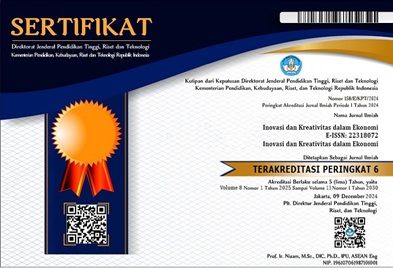REFORMULASI METODE PENGUKURAN PENDAPATAN NASIONAL DALAM ERA EKONOMI BERBASIS PENGETAHUAN DAN KEBERLANJUTAN
Kata Kunci:
Pendapatan Nasional, Ekonomi Berbasis Pengetahuan, KeberlanjutanAbstrak
Penelitian ini mengkaji reformulasi metode pengukuran pendapatan nasional dalam menghadapi transformasi ekonomi berbasis pengetahuan dan meningkatnya urgensi keberlanjutan. Melalui pendekatan kualitatif dengan jenis penelitian kepustakaan, studi ini menganalisis keterbatasan metodologis sistem pengukuran konvensional dan mengembangkan model terintegrasi yang mengakomodasi karakteristik ekonomi kontemporer. Hasil penelitian menunjukkan bias sistematis berupa underestimation pada sektor berbasis pengetahuan hingga 35% dan overestimation pada sektor ekstraktif sebesar 15-25% setelah internalisasi biaya lingkungan. Model pengukuran terintegrasi yang dikembangkan dengan struktur berlapis menghasilkan estimasi pendapatan nasional terkoreksi yang berbeda 8,2% dari PDB konvensional Indonesia periode 2018-2022. Implementasi reformulasi ini memerlukan pengembangan infrastruktur statistik baru dan pendekatan implementasi bertahap dengan strategi dual-track. Reformulasi pengukuran pendapatan nasional berimplikasi pada perubahan fundamental dalam evaluasi kinerja ekonomi, prioritisasi investasi publik, dan desain kebijakan fiskal. Temuan ini berkontribusi pada pengembangan teoretis ekonomi makro kontemporer sekaligus menyediakan kerangka praktis untuk transisi Indonesia menuju ekonomi berpendapatan tinggi yang berkelanjutan dengan mempertimbangkan baik aset pengetahuan maupun modal alam dalam evaluasi kesejahteraan ekonomi jangka panjang.
This research examines the reformulation of national income measurement methods in responding to knowledge-based economic transformation and increasing sustainability urgency. Through a qualitative approach with library research methodology, this study analyzes the methodological limitations of conventional measurement systems and develops an integrated model accommodating contemporary economic characteristics. Research findings reveal systematic bias in the form of underestimation in knowledge-based sectors up to 35% and overestimation in extractive sectors by 15-25% after internalizing environmental costs. The integrated measurement model developed with a layered structure produces adjusted national income estimates that differ by 8.2% from Indonesia's conventional GDP for the 2018-2022 period. Implementation of this reformulation requires the development of new statistical infrastructure and a phased implementation approach with a dual-track strategy. The reformulation of national income measurement implies fundamental changes in economic performance evaluation, public investment prioritization, and fiscal policy design. These findings contribute to the theoretical development of contemporary macroeconomics while providing a practical framework for Indonesia's transition toward a sustainable high-income economy by considering both knowledge assets and natural capital in evaluating long-term economic welfare.





